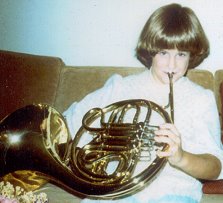I have had a great time playing Richard Strauss's opera Salome this week, happy that I was in relatively decent shape and able to step in when they hadn't found a horn player to replace me. I had missed my job. And I had never played a Strauss opera.
It was a great experience, but initially Salome totally kicked my ass. The counting, instantaneous meter and tempo changes, and transpositions were enough to make my head spin. Man, was it hard, especially after being away from work for two months (I'm going back on maternity leave after this; I'll go back to work officially in April). Barnewitz, who has played the Santa Fe Opera for many years and was nailing the insanely difficult Principal Horn part with amazing ease, says that this is the easiest of the several Strauss operas he's played. Holy crap. That was humbling.
Some of the things I love about this opera are its length (only 90 minutes total, without intermission), fantastically sensationalist and riveting score, and grippingly depressing and disturbing story. I wrote this post about Salome back in 2006 when David and I went to see it in Chicago, but I still just can't believe how messed up the plot is. Salome is 14 and her mother, Herodius, marries her uncle Herod after her father dies. Herod openly lusts after his stepdaughter (his former niece) right in front of her mother. Makes Jerry Springer look tame, doesn't it? Salome is curious about John the Baptist, who has been imprisoned in the basement of their palace for openly spewing venomous judgments against Herodius for marrying her brother-in-law. (Oh sure, in the Bible, men are allowed to take lots of wives and openly sleep with their handmaidens to produce children and have recreational concubines without shame, but god forbid a woman remarry after her husband dies...gross as it is that she marries her bro-in-law...)
So anyway, Salome seduces one of the guards and convinces him to let her see John the Baptist. She falls madly in lust with him, all buff and bare-chested and long-haired in his chains, and tries to seduce him, too. But he just tells her that she's evil, that "by woman evil did come into this world" (again, gotta love the Bible's scant and mostly misogynist portayal of women) and to get the hell away from him.
Now, I'm not saying he should have given her what she wanted, but man, couldn't he have been less of an asshole to her in the process of letting her down? Like, "Look, hon, I'm just not that into you. The life of a prophet and everything, you know. Can't do it. But I wish you well. No hard feelings, 'k?" But no, all this anger and judgment is like throwing a match into a gas chamber. Clearly, Salome's living a less than ideal life with a stepfather/uncle always trying to get into her pants. JTB does sing some really beautiful parts prophesying the coming of Jesus, to be fair, but in the same breath he completely disses her mother. And viciously, too.
So of course, Salome, Princess of Judea, is used to getting what she wants. (I never said she wasn't spoiled.) And she is most certainly not used to her seductions falling short of any man she wants. So she is absolutely livid. She goes upstairs and her stepfather, nasty and pedophilic as always, says he'll give her anything she wants if she'll do a sexy dance for him. After the evil light bulb goes off in her head, Salome does. This is the famous Dance of the Seven Veils, which is spine-chillingly raucous; sort of a late-romantic interpretation of a middle-eastern strip-tease. (I'm not sure if our Salome strips down to a body stocking; the Salome in the Lyric Opera of Chicago version we saw did. You only saw her naked for a split second before the lights went out.)
So then Herod, who after this dance is panting and ridiculously horny, asks Salome what she wants in exchange for her entertainment. She demands the head of John the Baptist on a platter. (You saw that coming, didn't you?) After much begging and pleading to give her anything else instead in vain, he finally agrees, and they bring it to her, all dripping and hairy, on the silver platter.
Now I'll admit this next part is completely nasty: Salome proceeds to dance with and sing to the head, kissing it and rubbing it all over her body, saying things like, "I got you after all" and "see, I got to kiss you anyway!". Her sparkly white dress and her entire mouth becomes stained with his blood. Eeeeeeeew.
Herod walks in on her doing this, suddenly realizes he wants her dead and orders the guards to kill her. They stab her with their bayonets as the opera crashes to its bitter end with a flourish of violent chords.
Despite its morbidity (and perhaps even because of it), this is really an amazing opera. Every second of it is filled with tension, and you are hanging on for the ride at every turn. Once I caught up with all the tempo changes and transpositions and felt confident about not trashing my part, I started really having a good time.
Here's my rant on the popular interpretation of Salome. Everyone focuses on how demented and evil Salome is. Fine, but how the hell would you have turned out if you were spoiled rotten, had never been denied anything but were simultaneously being molested by your uncle, who is also your stepfather? And why doesn't anyone seem to remonstrate Herod's pedophilic ways, or his wife's ineffectual passivity and voyeurism as he lecherously drools over her daughter? And what about the aforementioned John The Baptist, who seems to think it his mission in life to tell everyone and their mothers that they're horrible and evil and going straight to hell in a handbasket?
I'm not saying Salome shouldn't be held accountable for her actions, but come on, people. Let's be fair and look at the whole picture, at all of the players involved in the admittedly dysfunctional family situation. It's the same thing when people judge prostitutes and strippers for what they do without even acknowledging, much less shining some of the same judgment on, the men who support them so well, whose conduct is equally immoral if not moreso. Yes, of course, women should seek empowerment and avoid such demeaning work, but I refuse to judge them for doing so unless the men who make such professions so lucrative stop enabling it. Both parties are equally reprehensible.
Subscribe to:
Post Comments (Atom)







3 comments:
And then, there's that bit of info some productions leave out, and that is Salome, not knowing what to ask for, asks her mother what she should do, and her mom dreamed up the head-on-a-silver-platter.
I'm thinking we should just call that whole family more than just a little dysfunctional.
You really should see Disney's "Hunchback of Notre Dame." I am really quite surprised with what they got away with in that movie in their indictment of the patriarchy of Christianity. When Judge Rollo sings the song where he blames Esmerelda for his lust for her, it is a scathing statement against the hypocrisy of the Catholic Church - and yet Disney made it! It is amazing!
As usual, your deconstruction is thought-provoking as well as hilariously entertaining!
Post a Comment